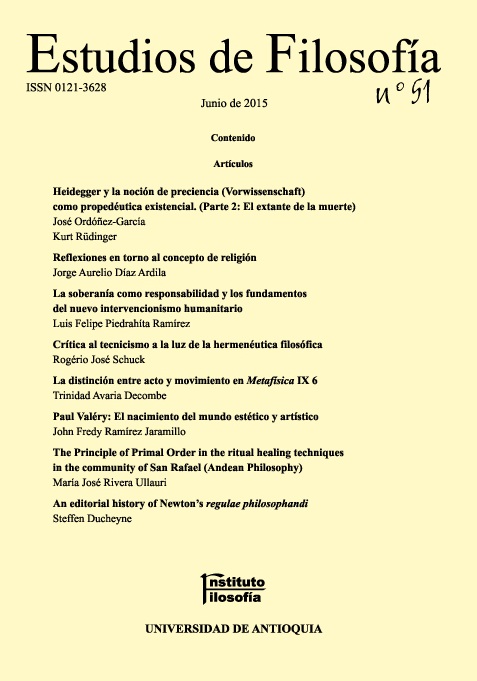Paul Valéry: the birth of the aesthetic and artistic world
DOI:
https://doi.org/10.17533/udea.ef.n51a07Keywords:
Paul Valéry, sensitivity, aesthetics, aesthetic pleasure, uselessness, artAbstract
In this paper I offer a study of the physiological and anthropological arguments through which Paul Valéry makes explicit the rise of an aesthetic and artistic dimension in man. To that end I present, first of all, the author's analysis on the phenomenon of sensitivity from which the aesthetic world takes its form. I then examine the relationship between the cognitive and emotional modulations that configure the experience of art. At the same time, I make explicit Valéry's theory according to which useless sensations and arbitrary acts are the origin of art. In correspondence with these arguments, I attempt to prove that for Valéry the experience of the aesthetic awakens in man a particular kind of desire that can never be entirely fulfilled. On the other hand, I demonstrate that Valéry's concept of the aesthetic infinite, through which he describes the value of artistic contemplation, is tied to a species of pleasure that favors in each consciousness a meaningful reinvention of the world. I also try to corroborate that Valéry's reflections on the birth of the aesthetic and the artistic phenomenons are supported by a deep and original knowledge of the sensitive and psychical nature of the human being.
Downloads
References
Auster, P. (2006) Discurso de aceptación del Premio Príncipe de Asturias de las Letras 2006. Sobre la inutilidad del arte, disponible en: http://www.fpa.es/ premios/2006/paul-auster/speech/. Acceso el 16 de julio de 2012.
Baron, R. (1997) Fundamentos de psicología. Trad. de M. Ortiz Salinas, México, Pretince Hall Hispanoamericana.
Bayer, R. (1987) Historia de la estética. Trad. de J. Reuter México, Fondo de Cultura Económica.
Celeyrette, N. (1970) Valéry et le moi. Des Cahiers à l’ oeuvre, Paris, Klincksieck.
Desideri, F. (2012) Asymétrie du plaisir et naissance de l’esthétique. À partir d’un motif Valéryen, Aisthesis. Pratiche, Linguaggi e Saperi dell’Estetico. Firenze, Vol 5, (1), pp.123-137. Disponible también en: http://www.fupress. net/index.php/aisthesis/article/view/11052/10530#footnote0
Gehlen, A. (1980) El hombre. Su naturaleza y su lugar en el mundo. Trad. de F. Vevia Romero, Salamanca, Sígueme.
Gehlen, A. (1993) Antropología filosófica. Del encuentro y descubrimiento del hombre por sí mismo. Trad. de C. Cienfuegos, Barcelona, Paidós.
Goodman, N. (1995) De la mente y otras materias. Trad. de R. Guardiola, Madrid, Visor.
Kant, E. (1991) Crítica de la facultad de juzgar. Trad. de P. Oyarzún, Caracas, Monte Ávila.
Kant, E. (1998) Crítica de la razón pura. Trad. de P. Rivas, Madrid, Alfaguara.
Mumford, L. (2010) El mito de la máquina. Técnica y evolución humana. Trad. de A. Rigodón, La Rioja-España, Pepitas de calabaza.
Pareyson, L. (2002) L’esthétique de Paul Valéry. Traduction de R. Pineri, Paris, Théétète.
Philippon, M. (2007) Le vocabulaire de Paul Valéry, Paris, Ellipses.
Pire, F. (1964). La tentation du sensible chez Paul Valéry. Bruxelles, La Renaissance du livre.
Thérien, C. (2002) Valéry et le statut «poïetique» des sollicitations formelles de la sensibilité, Les études philosophiques, Paris, No62, pp. 353-369.
Valéry, P. (1945) Política del espíritu. Trad. de A. Battistessa, Buenos Aires, Losada.
Valéry, P. (1956) Variedad II. Trad. de A. Bernárdez y J. Zalamea, Buenos Aires, Losada.
Valéry, P. (1973) Cahiers I. Paris, Gallimard.
Valéry, P. (1974) Cahiers II, Paris, Gallimard.
Valéry, P. (1990) Teoría poética y estética. Trad. de C. Santos, Madrid, Visor.
Valéry, P. (1993) Estudios filosóficos. Trad. de C. Santos, Madrid, Visor.
Valéry, P. (1999a) Cahiers 1894-1914, VII. Paris, Gallimard.
Valéry, P. (1999b) Piezas sobre arte. Trad. de J. Arántegui, Madrid, Visor.
Valéry, P. (2001) Cahiers 1894-1914, VIII. Paris, Gallimard.
Valéry, P. (2003) Mi fausto (Esbozos). Trad. de J. Arántegui, Madrid, A. Machado Libros-Visor.
Valéry, P. (2007) Cuadernos (1894-1945). Trad. de A. Sánchez Robaina (et al.), Barcelona, Círculo de Lectores. Galaxia Gutenberg.
Valéry, P. (2012) Cahiers 1894-1914, XII. Paris, Gallimard.
Published
How to Cite
Issue
Section
Categories
License
Copyright (c) 2015 John Fredy Ramírez Jaramillo

This work is licensed under a Creative Commons Attribution-NonCommercial-ShareAlike 4.0 International License.
Authors who publish with this journal agree to the following terms:
1. The Author retains copyright in the Work, where the term "Work" shall include all digital objects that may result in subsequent electronic publication or distribution.
2. Upon acceptance of the Work, the author shall grant to the Publisher the right of first publication of the Work.
3. The Author shall grant to the Publisher a nonexclusive perpetual right and license to publish, archive, and make accessible the Work in whole or in part in all forms of media now or hereafter known under a Creative Commons Attribution-NoCommercia-ShareAlike (CC BY-NC-SA 4.0), or its equivalent, which, for the avoidance of doubt, allows others to copy, distribute, and transmit the Work under the following conditions: (a) Attribution: Other users must attribute the Work in the manner specified by the author as indicated on the journal Web site;(b) Noncommercial: Other users (including Publisher) may not use this Work for commercial purposes;
4. The Author is able to enter into separate, additional contractual arrangements for the nonexclusive distribution of the journal's published version of the Work (e.g., post it to an institutional repository or publish it in a book), as long as there is provided in the document an acknowledgement of its initial publication in this journal;
5. Authors are permitted, and Estudios de Filosofía promotes, to post online the preprint manuscript of the Work in institutional repositories or on their Websites prior to and during the submission process, as it can lead to productive exchanges, as well as earlier and greater citation of published work (see The Effect of Open Access). Any such posting made before acceptance and publication of the Work is expected be updated upon publication to include a reference to the Estudios de Filosofía's assigned URL to the Article and its final published version in Estudios de Filosofía.















